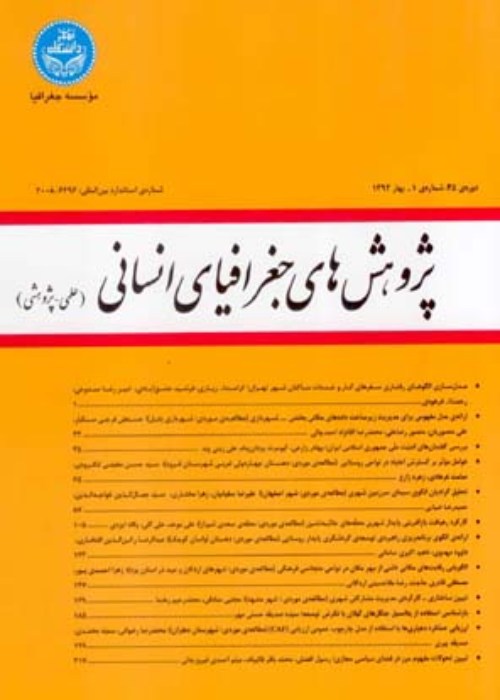The Effect of Spatial Minorities on National Power(by Emphasis on Ethnicity Minorities)
Author(s):
Abstract:
IntroductionThe concept of power and its presence in the world of politics are so significant that experts like Wolfers compare it with the role of money in the world of economy and believe that the function of power in the world of politics is exactly similar to the function of money in the world of economics (Seyfzadeh 1379, 170). To be more precise, today nations are struggling to gain, maintain, or demonstrate power (Alem 1376, 188). So, what matters in international relations is the power of political units which, under the title of national power and through gaining geopolitical weight, increases bargaining power of nations in regional and global relations and in this way guarantees national security. One of the primary and challenging geopolitical problems for countries in international system, is the existence of conflicts and lack of correspondence between theoretical and true definitions of national government. The ethnic, lingual, racial, and cultural variety of government's (minorities') population structure has made it difficult for governments to create an integrated national identity. That is why world's political map is constantly changing and new countries are born. Countries that have an integrated nation or are monoethnic, enjoy national integrity as an empowering factor (Hafeznia 1385, 283). In contrast, presence of different nationalities in a country can act like centrifugal force, i.e. if minoritie's rights are neglected, national identity and security will be endangered (Karimipour 1379, 25). Globalization process in information, economic, and even political aspects has threatened national boundaries and released bottom forces upward. Having new political, social, and cultural demands, these forces have exposed national governments to numerous problems (Gheisary 1382, 398). This issue has changed some of the conventional functions of national governments, which were meant for sovereignty and territorial integrity. With regard to the fact that minority support was part of European and American diplomacy in 20th century, today foreign powers interfere in countrie's affairs, especially those of the third world, which results in minoritization and has set the scene for conflicts between spatial minorities and governments (Bazarsalan & Ibid 1997, 16-17). Also awakening of internal identities, when they are in contrast with a greater identity, called national identity, increases the pressure on government. As Jasper Biro says, today the incidents and crises related to the demands of minorities and ethnic groups are so widespread that 21th century could be called "the century of ethnic resurrection" (Biro 1998, 15). So, taking into account the role of population heterogeneity in government's power, these questions need to be regarded as important issues: what is the role of spatial minorities in increasing or decreasing national power? What procedure do spatial minorities adopt to satisfy their demands? How can foreign agents passivize spatial minorities? What approaches are helpful to decrease the pressure of spatial minorities on governments? What is the role of national governments in management and organization of spatial minorities? The hypothesis made at the outset is that diversity and variety of minorities decreases countrie's national power.
MethodologyAdopting descriptive-analytic research design and using library data and websites related to political sciences, political geography, and sociology, this study aims to find out how spatial minorities, as a political phenomenon, can threaten sovereignty and power of governments, following the procedure of globalization and due to upward release of bottom forces. The independent variable in this study is national power and generally speaking, sovereignty of governments. The independent variable is the phenomenon of spatial minorities.
ResultsDeep structural attempts made to homogenize and transform the ethnic-cultural variety in most countries, especially modern ones, indicates the effect of minorities on their power. Taking into account its role in the process of political participation and ultimately its effect on legitimization of ruling systems, homogeneity of population, whether quantitative or qualitative, is one of the most important components of national power which, compared to economic, military, geographical, etc factors has a more fundamental role in political success and empowering the nations. In order to reduce tensions and stop ethnic conflicts, we need to resort to solutions which neutralize conditions and reasons behind tensions and crises. These solutions, as well as respecting minoritie's identity, should guarantee their rights to justly benefit country's political and economic resources. As factors like foreign support, weakness of central government, and minoritie's demands could lead to violent and separatist movements by ethnic groups, attempts must be made to reduce the tendencies toward passivity and challenging the minorities. To do so, the following points are of great importance:- enhancing political knowledge of all layers of society and informing them about foreign interference in ethnic conflicts
- creating cooperative platforms in political, economic, and social arenas
- attempt to increase power which adds to authority and influence of political systems in global transactions
- attempt to increase job opportunities all over the country
- attempt to prioritize construction and development especially in border areas
- using ability of ethnic elites to manage ethnic areas.
ConclusionThe most important mechanism through which national ends and interests are realized is to achieve national power which is obtained from different social, economic, geographic, technological, military, and political sources in a collective function. However, development of ethnic conflicts and its significance in international politics together with the vision that national power is undermined by ethnicities, has become an extensible theory in analyzing ethnicity relations and political power challenge. In this regard, "nation's mixture", "minority quantity", and "people's (or minorities') political participation" has always been at the center of attention by governments, as they indicate the degree to which the population is homogeneous or heterogeneous and consequently shows the level of the society's political participation - an indication of legitimizing the ruling system. This paper postulates that minority group's mutual relations with government can increase or decrease national power. The research design is descriptive-analytic and the results indicate that a combination of minoritie's demands, weakness of government and foreign supports, can play a role in decreasing countrie's national power.
MethodologyAdopting descriptive-analytic research design and using library data and websites related to political sciences, political geography, and sociology, this study aims to find out how spatial minorities, as a political phenomenon, can threaten sovereignty and power of governments, following the procedure of globalization and due to upward release of bottom forces. The independent variable in this study is national power and generally speaking, sovereignty of governments. The independent variable is the phenomenon of spatial minorities.
ResultsDeep structural attempts made to homogenize and transform the ethnic-cultural variety in most countries, especially modern ones, indicates the effect of minorities on their power. Taking into account its role in the process of political participation and ultimately its effect on legitimization of ruling systems, homogeneity of population, whether quantitative or qualitative, is one of the most important components of national power which, compared to economic, military, geographical, etc factors has a more fundamental role in political success and empowering the nations. In order to reduce tensions and stop ethnic conflicts, we need to resort to solutions which neutralize conditions and reasons behind tensions and crises. These solutions, as well as respecting minoritie's identity, should guarantee their rights to justly benefit country's political and economic resources. As factors like foreign support, weakness of central government, and minoritie's demands could lead to violent and separatist movements by ethnic groups, attempts must be made to reduce the tendencies toward passivity and challenging the minorities. To do so, the following points are of great importance:- enhancing political knowledge of all layers of society and informing them about foreign interference in ethnic conflicts
- creating cooperative platforms in political, economic, and social arenas
- attempt to increase power which adds to authority and influence of political systems in global transactions
- attempt to increase job opportunities all over the country
- attempt to prioritize construction and development especially in border areas
- using ability of ethnic elites to manage ethnic areas.
ConclusionThe most important mechanism through which national ends and interests are realized is to achieve national power which is obtained from different social, economic, geographic, technological, military, and political sources in a collective function. However, development of ethnic conflicts and its significance in international politics together with the vision that national power is undermined by ethnicities, has become an extensible theory in analyzing ethnicity relations and political power challenge. In this regard, "nation's mixture", "minority quantity", and "people's (or minorities') political participation" has always been at the center of attention by governments, as they indicate the degree to which the population is homogeneous or heterogeneous and consequently shows the level of the society's political participation - an indication of legitimizing the ruling system. This paper postulates that minority group's mutual relations with government can increase or decrease national power. The research design is descriptive-analytic and the results indicate that a combination of minoritie's demands, weakness of government and foreign supports, can play a role in decreasing countrie's national power.
Keywords:
Language:
Persian
Published:
Human Geography Research Quarterly, Volume:49 Issue: 101, 2017
Pages:
673 to 689
magiran.com/p1751122
دانلود و مطالعه متن این مقاله با یکی از روشهای زیر امکان پذیر است:
اشتراک شخصی
با عضویت و پرداخت آنلاین حق اشتراک یکساله به مبلغ 1,390,000ريال میتوانید 70 عنوان مطلب دانلود کنید!
اشتراک سازمانی
به کتابخانه دانشگاه یا محل کار خود پیشنهاد کنید تا اشتراک سازمانی این پایگاه را برای دسترسی نامحدود همه کاربران به متن مطالب تهیه نمایند!
توجه!
- حق عضویت دریافتی صرف حمایت از نشریات عضو و نگهداری، تکمیل و توسعه مگیران میشود.
- پرداخت حق اشتراک و دانلود مقالات اجازه بازنشر آن در سایر رسانههای چاپی و دیجیتال را به کاربر نمیدهد.
In order to view content subscription is required
Personal subscription
Subscribe magiran.com for 70 € euros via PayPal and download 70 articles during a year.
Organization subscription
Please contact us to subscribe your university or library for unlimited access!



